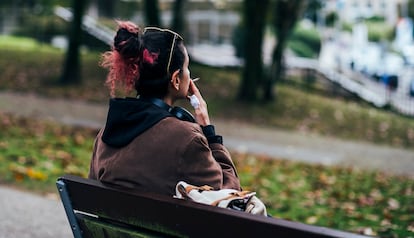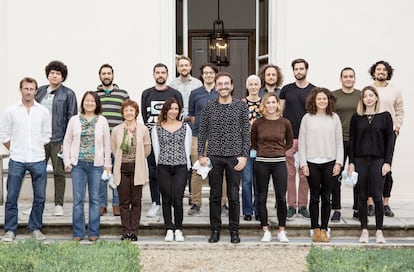Smoking is the factor that most alters our defenses, even years after quitting
An experiment with 1,000 people from the same city that began over a decade ago reveals the unknown persistent effects of tobacco on our immune responses

The Covid pandemic was a master class in understanding that each person has characteristic defenses against diseases. Some people who got infected with the coronavirus did not even realize it, while others died in a matter of days. A little over a decade ago, the Spanish biologist Lluís Quintana-Murci and his American colleague Matthew Albert began a bold experiment to understand the determining factors of this variability. They recruited 1,000 healthy people between 20 and 70 years of age in the French city of Rennes, choosing 100 volunteers of each sex for each decade. They all provided blood and stool samples and filled out a 44-page questionnaire about their lifestyle. Skin biopsies were even taken to grow their cells in the laboratory. The latest results were presented on Wednesday, and they show that smoking is the factor that most alters defenses, even years after having stopped smoking.
There are more than 100 reasons to reject tobacco, according to a count kept by the World Health Organization: the greater risk of suffering from cancer or a heart attack, bad body odor, the expense, facial wrinkles, yellowish teeth, damage to people exposed to second-hand smoke. Reasons 79, 80, 81 and 82 detail that the toxic substances in tobacco weaken the immune system and increase the risk of infections, tumors, autoimmune diseases and AIDS. The new study, published today in the journal Nature, warns that the white blood cells of ex-smokers remain altered for years. It is the environmental factor that has the most influence of the 136 variables that were analyzed, followed by body mass index and latent infections by cytomegalovirus, a pathogen known to leave consequences in one in five affected babies.
The authors of the study, from the Pasteur Institute in Paris, focused on the production of cytokines, proteins that are released in cells when they detect a pathogen and help coordinate the immune response. The researchers, led by biologist Violaine Saint-André and immunologist Darragh Duffy, observed that smoking affects the non-specific innate defenses with which we are born, causing greater inflammatory responses. This harmful effect disappears when you quit smoking. However, scientists detected that the cells responsible for specific immunity — those acquired during life — remain altered for years after quitting. Smoking is the only factor with effects that are comparable to immutable variables such as age, sex and genetics.

The researchers assert that their results “have potential clinical implications for the risk of developing infections, cancers or autoimmune diseases,” but they are cautious. They have not yet studied the relationship between this alteration of white blood cells and tumors. “However, it is well known from much other previous work that smoking increases the risk of multiple types of cancer, but the longer it has been since you stopped smoking, the lower the risk,” explains Duffy. The immunologist cites a recent study with almost three million participants in South Korea where researchers observed a 50% reduction in the risk of cancer after 15 years of quitting smoking.
The 1,000 volunteers in Rennes have Western European ancestors, to facilitate analysis in a genetically homogeneous population, but the authors are already working on similar experiments in other locations, such as Senegal and Hong Kong.
The president of the Spanish Society of Immunology, Marcos López Hoyos, applauded the new work, in which he has not participated. “In many patients with chronic smoking and COPD [chronic obstructive pulmonary disease] we have always seen a clinical finding: we found hypogammaglobulinemia [low levels of antibodies], which is a cause of secondary immunodeficiency,” he points out. “In COPD with smoking there are more infections and there is more cancer. The alteration of the cytokines that they have observed clearly indicates that it can favor an alteration in the regulation of the immune response and generate these diseases, although they do not prove it,” says López Hoyos, who is the scientific director of the Marqués de Valdecilla Research Institute in Santander. “It’s a beautiful experiment.”
The new results are “very interesting, but not surprising,” according to oncologist Alberto Ocaña, who urges caution. “The study only shows that tobacco alters the immune system, not that these alterations are the cause of cancer. Cancer is a genetic disease that also requires other added alterations, such as a dysfunctional immune system,” explains Ocaña, coordinator of the Experimental Cancer Therapies Unit at the San Carlos Clinical Hospital in Madrid.
The Pasteur Institute team has grown cells from volunteers, put them in contact with different substances in the laboratory and analyzed how they behave. Immunologist África González, from the University of Vigo, is surprised by the duration of the effects of smoking. “It is striking that this signature is persistently maintained in the immune system, as if to say: “You have smoked.” And those cells, when they have been exposed to tobacco, are going to behave differently against a pathogen,” she reflects. “They cannot say categorically that this alteration increases your risk of cancer, but tobacco itself not only alters the immune response, but also contains many substances that are carcinogenic in themselves.”
Sign up for our weekly newsletter to get more English-language news coverage from EL PAÍS USA Edition
Tu suscripción se está usando en otro dispositivo
¿Quieres añadir otro usuario a tu suscripción?
Si continúas leyendo en este dispositivo, no se podrá leer en el otro.
FlechaTu suscripción se está usando en otro dispositivo y solo puedes acceder a EL PAÍS desde un dispositivo a la vez.
Si quieres compartir tu cuenta, cambia tu suscripción a la modalidad Premium, así podrás añadir otro usuario. Cada uno accederá con su propia cuenta de email, lo que os permitirá personalizar vuestra experiencia en EL PAÍS.
¿Tienes una suscripción de empresa? Accede aquí para contratar más cuentas.
En el caso de no saber quién está usando tu cuenta, te recomendamos cambiar tu contraseña aquí.
Si decides continuar compartiendo tu cuenta, este mensaje se mostrará en tu dispositivo y en el de la otra persona que está usando tu cuenta de forma indefinida, afectando a tu experiencia de lectura. Puedes consultar aquí los términos y condiciones de la suscripción digital.









































